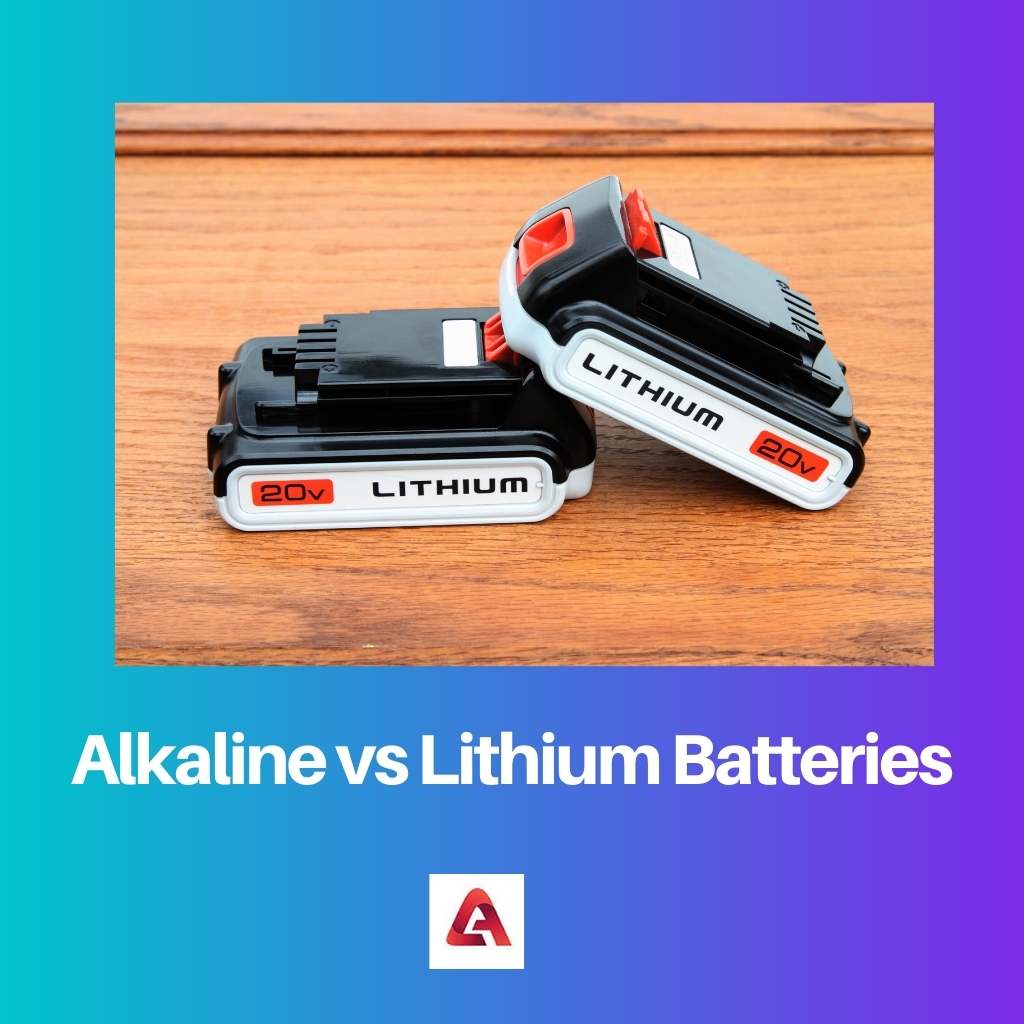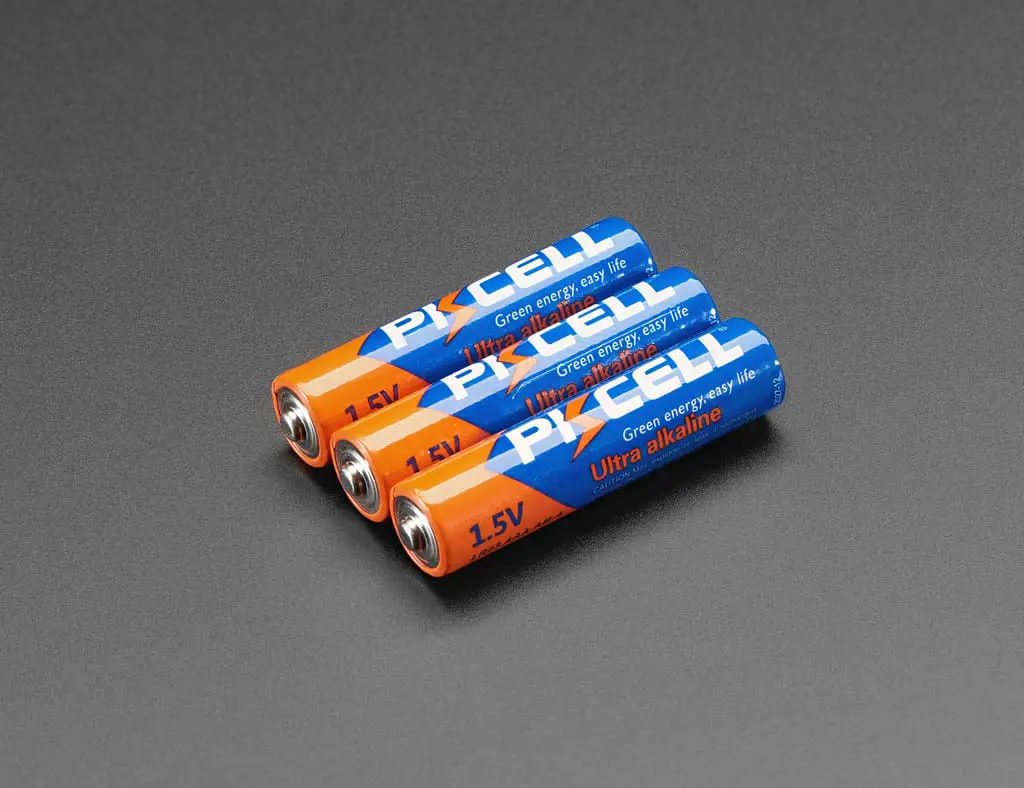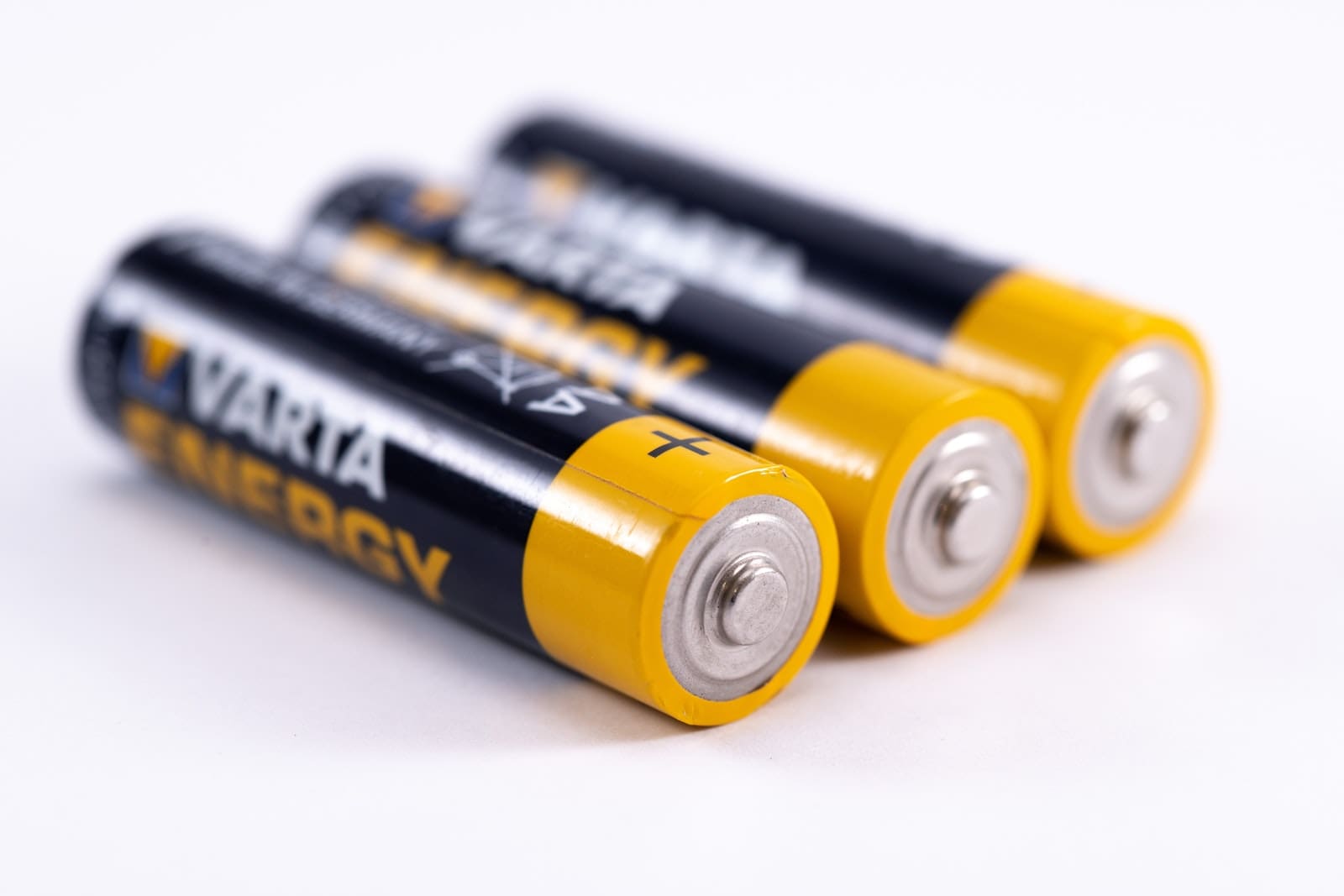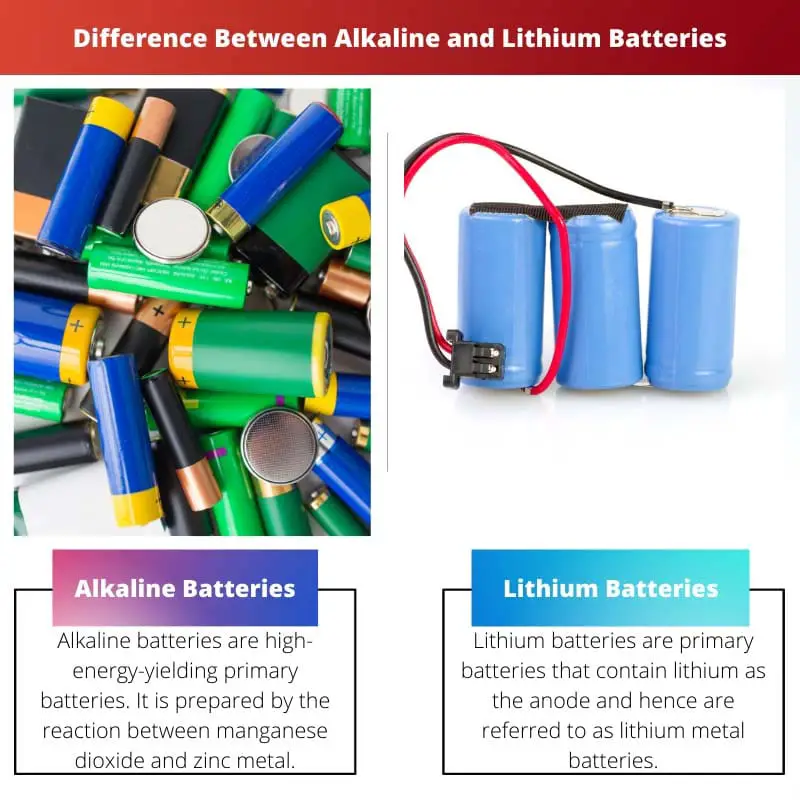Batteries are used to function/ run portable electronic devices. There are two types of batteries are Alkaline batteries and Lithium batteries.
They are cost-effective and have quite a high charge density. Both the battery types (alkaline batteries and lithium batteries) are effective in powering a number of/ several electronic gadgets.
Key Takeaways
- Alkaline batteries have a lower energy density and shorter lifespan than lithium batteries.
- Lithium batteries perform better in extreme temperatures and provide a more consistent voltage.
- Alkaline batteries cost less than lithium batteries, making them more affordable for everyday use.
Alkaline vs Lithium Batteries
Alkaline batteries are batteries that have a short lifespan and tend to drop in voltage as they are used. Alkaline batteries are better for low-drain devices. Lithium batteries are batteries that have a higher energy density and are better suited for high-drain devices like digital cameras.

Alkaline batteries are high-energy-yielding primary batteries. The reaction between manganese dioxide and zinc metal prepares it.
Even though they have a high energy-yielding capacity, these batteries provide equal amounts of voltage as a zinc chloride or zinc-carbon battery.
These batteries also provide a decent charge density.
Lithium batteries are primary batteries that contain lithium as the anode and hence are referred to as lithium metal batteries.
They provide a high charge density and transmit a voltage between the range of 1.5 V to 3.7 V.
The main battery setup consists of an anode (lithium), a cathode (manganese dioxide), and an electrolyte (salt of lithium).
Comparison Table
| Parameters Of Comparison | Alkaline Batteries | Lithium Batteries |
|---|---|---|
| Significance | Alkaline batteries are primary, energy-yielding batteries that have a quite high shelf life. | Lithium batteries are high charge density primary batteries that have a moderate shelf life. |
| Voltage Range | Alkaline batteries serve a voltage power ranging between 1.55 V to 1.65 V. | Lithium batteries serve a voltage power ranging from 3.0 V to 4.2 V. |
| Shelf Life | These batteries have a shelf life ranging from 5 to 10 years. | These batteries have a shelf life ranging from 3 to 6 years. |
| Devices Used In | Alkaline batteries are used in gadgets like CD players, toys, radios, etc. | Lithium batteries are used in electronic devices like thermometers, calculators, hearing aids, etc. |
| Also Called | “AA batteries” is another way to refer to alkaline batteries | “Lithium metal batteries” is another name for lithium batteries. |
What are Alkaline Batteries?
Alkaline batteries are primary, high-energy-yielding, and high-charge-density batteries. They have quite a long shelf life. The shelf life of alkaline batteries ranges from five to ten years.
Alkaline batteries run on a high energy density. The energy these batteries provide is much higher than zinc carbon and chloride batteries.
Alkaline batteries, or AA batteries, also have a high charge density.
AA batteries compose of manganese and zinc dioxides as electrodes. The electrolyte used in this case is alkaline and is either sodium or potassium hydroxide.
These batteries an excellent and very good leakage resistance.
Alkaline batteries have a shelf life of five to ten years. This is the shelf life of an alkaline battery when it’s kept at room temperature.
Room temperature, in general, ranges between 68 to 72 degrees Fahrenheit or 20 to 22 degrees Celsius. They are very unlike other cylinder-shaped lithium batteries.
Alkaline batteries are quite cheap, easily affordable, and available. The latter has a quite heavy body, making it inconvenient to use in a few electronic devices.
The voltage provided in this case is between 1.55 V to 1.65 V.
Alkaline batteries are used in the following electronic gadgets:
- CD players
- MP 3 players
- Radio
- Flashlight
- Toys
- Digital cameras

What are Lithium Batteries?
Lithium batteries are also called lithium metal batteries. The name is because the anode used in a lithium battery is lithium metal.
They have a very high charge density and a quite high cost per unit. This property of lithium batteries separates them from other battery types.
Their voltage contribution ranges between 1.5 V to 3.7 V. The batteries are light weighted and hence are an easy tool to be used in electronic devices.
In this case, lithium acts as the anode, manganese dioxide acts as the cathode, and the salt of lithium mixed in a solvent (organic) serves as the electrolyte.
Lithium batteries are used in a number of portable electronic gadgets like:
- Vaping gadgets
- Electronic kinds of toothpaste
- Hoverboards
- E-bikes
- Scooters
- Laptop
Lithium batteries have a shelf life ranging between three to six years. They are light weighted and easy to use.
These batteries also have a heavy cost price.
Lithium metal batteries function in extreme climate conditions. They can operate in extreme cold conditions without any problem.
These batteries can also work in extremely hot climatic conditions without any hassle.
This property of lithium metal batteries works in extreme environmental conditions, making them perfect for use outdoors.

Main Differences Between Alkaline and Lithium Batteries
- Alkaline batteries are also called AA batteries, while on the other hand, lithium batteries are also called lithium metal batteries.
- Alkaline batteries operate/ function for up to 5 to 10, whereas lithium batteries function for up to 3 to 6 years.
- Alkaline batteries generate energy for a long duration, while on the other hand, lithium batteries generate energy for a short period of time.
- Alkaline batteries are sold at cheap rates or prices, whereas lithium batteries are sold at quite heavy charges.
- Alkaline batteries have a heavyweight while on the other hand while lithium batteries are lightly weighted.

- https://www.sciencedirect.com/science/article/abs/pii/S0956053X05001212
- https://books.google.co.in/books?hl=en&lr=&id=BW5MAAAAQBAJ&oi=fnd&pg=PR15&dq=info:BTpveTRmAfQJ:scholar.google.com/&ots=UDkxx-JNSO&sig=-tb7yzxcKrcUscM8OEvnNhbxk7o&redir_esc=y#v=onepage&q&f=false

The comprehensive details about the composition, shelf life, voltage range, and uses of Alkaline and Lithium batteries provide valuable insights into the functionality and suitability of each battery type. Well-organized and enlightening content.
The comparison table is particularly useful as it provides a quick overview of the various parameters, making it easier for the readers to understand the comparison between Alkaline and Lithium batteries. A well-structured and insightful article.
The article comprehensively compares Alkaline batteries and Lithium batteries, providing clear and concise knowledge about the differences between the two. The detailed information about each battery type is highly informative and beneficial for those looking for in-depth knowledge.
The comparison of main differences between Alkaline and Lithium batteries in a bulleted format is an effective way to summarize the key disparities between the two battery types. This approach enhances the clarity and understanding of the readers.
The article lucidly explains the technical aspects of Alkaline and Lithium batteries, addressing their energy density, voltage range, shelf life, and practical applications. It provides an insightful comparison of the two battery types with an intellectual and scientific approach.
The detailed explanations along with the examples of devices in which the Alkaline and Lithium batteries are used help in better understanding their practical applications and advantages. A well-researched and informative article.